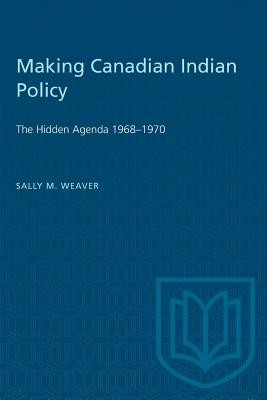| Making Canadian Indian Policy: The Hidden Agenda 1968-1970 Contributor(s): Weaver, Sally M. (Author) |
|
 |
ISBN: 0802064035 ISBN-13: 9780802064035 Publisher: University of Toronto Press OUR PRICE: $30.35 Product Type: Paperback - Other Formats Published: December 1981 |
| Additional Information |
| BISAC Categories: - Social Science | Ethnic Studies - Native American Studies - Political Science | Public Policy - Social Policy - Political Science | Public Policy - Cultural Policy |
| Dewey: 323.119 |
| LCCN: 80094754 |
| Series: Heritage |
| Physical Information: 0.59" H x 6.14" W x 9.21" (0.89 lbs) 260 pages |
| Themes: - Ethnic Orientation - Native American |
| Descriptions, Reviews, Etc. |
| Publisher Description: The Trudeau government's White Paper on Indian policy issued in 1969 was a shock to members of the general public as well as the Indian population. Proposing to terminate all special rights, including the Indian Act, reserves, and treaties, it was diametrically opposed to what the Indians had been led to believe: that their rights would be honoured and that they would participate in shaping the policies that determined their future. The book looks inside the federal government in the early Trudeau years to see how that White Paper was formulated. The author examines ideologies held by major policy makers in the face of concepts of public participation and public servant activism -- two approaches to policy making closely coupled in Ottawa during the period. She reveals how the policy was developed behind close doors by a number of conflicting bureaucracies, in spite of the efforts of those who recommended Indian participation. The result was Indian militancy and mistrust, the very condition with the government hoped to dispel. The White Paper was shelved in 1970, but it left a powerful legacy. It continues to have an impact on government-Indian relations, as the Indians judge current policies and action on the basis of their memories. The author evaluates this impact and its implications for future governments with an eye to avoiding past errors. The book contributes to a greater understanding of government policy making. It demonstrates that personal aspirations and histories, individual philosophies, and political craftsmanship can dominate reason and logic in policy formation. |
Contributor Bio(s): Weaver, Sally M.: - SALLY M. WEAVER is a member of the Department of Anthropology at the University of Waterloo. |